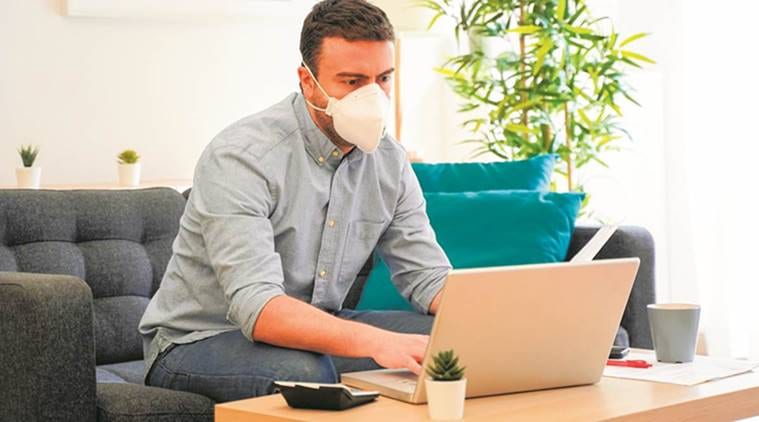 What kind of initiatives are companies taking for their employees amid second wave of the pandemic? (Source: Getty Images/Thinkstock)
What kind of initiatives are companies taking for their employees amid second wave of the pandemic? (Source: Getty Images/Thinkstock) It would not be wrong to say the pandemic has altered our way of living, making ‘work from home‘ module the new normal. But while staying at home is considered safe, many people have still not been spared of the wrath of the virus, which not only affected physical health but also mental well-being. Amid all this, people continued to meet their targets and attend work meetings. Many employers came to their rescue and lent a helping hand by offering various beneficiary initiatives and policies that directly concern their overall well-being. Some of these, especially rolled out amid the second wave, include vaccination drives, Covid leaves, helpline numbers in case of need for oxygen, hospital beds, etc., which have been immensely welcomed by the beneficiaries.
K E Aarthy, principal business analyst, working with a US-based MNC, shared that her company has been “supportive” since last year, when the crisis began. “They have been giving 15 days of paid Covid leave in case an employee or any family members are affected and need to be taken care of. This year, they have started an exclusive helpline number to reach out for help in getting oxygen or beds, etc. They have also given us an option to enroll for free on an online doctor consultation platform,” she told indianexpress.com while sharing that the company has arranged to procure oximeter for employees at a subsidised rate and that medical insurance covers treatment cost.
 Here’s what companies are doing for employees in the second wave. (Photo: Getty Images/Thinkstock)
Here’s what companies are doing for employees in the second wave. (Photo: Getty Images/Thinkstock)
Vaccine drive is another initiative undertaken by many companies. “We have decided to cover the vaccination cost for our entire team if they choose to get vaccinated. We have been on the frontlines with our Covid-19 Risk Management solution. We thank our employees for being patient and resilient as we work together to pull through these extraordinary times,” said Dr Ramanan Laxminarayan, founder, HealthCube.
Some have even worked towards providing validated and updated information on medicine availability, hospital beds, oxygen support etc., aiding access to quality medical services quickly and easily and providing employees with on-ground support.
“To ensure round-the-clock access to such information and support, we set up a Covid War Room and launched the One NTT Covid Response Mobile Application for our employees. Further, KITA, an automated help desk for query routing and response is also available. Services such as telemedicine and emergency ambulance access have also been made available,” said KN Murali, head, HR and admin, NTT Ltd in India.
The second wave of the pandemic has also made people extremely anxious owing to personal losses as well as concerns regarding family’s health. “A sense of hopelessness and guilt has risen amongst people. They are feeling emotionally numb and there is a lot of grief and anxiety one has to deal with. It is more painful because it is anxiety that is stemming from our very basic need – survival. Furthermore, protecting and helping loved ones survive is also causing people to break down emotionally,” said Sahana S, clinical psychologist and outreach associate, Mpower The Centre – Bengaluru.
To reduce the burden, some companies have “aligned employment opportunities” for eligible family members in terms of full-time roles, on-job training, and internships. “The organisation has decided to provide the affected employees financial support in the form of a two-month salary advance, alongside advance leave credit for new joinees,” said Sanjeev Meghani HR-Head, Care Health Insurance.
In addition to such initiatives, companies like Care have also tied up with a healthcare platform to facilitate the booking of RT-PCR or any other blood tests. “We have created a pool for our employees and family members in case of any need, in addition to operating a medical consultation panel and in-house medical advisory. Furthermore, our leadership team is constantly in touch with employees for any assistance through regular employee engagement sessions,” stated Meghani.
Access to Covid screening plan, doorstep medicine delivery, doctor on call/teleconsultation, and hotel isolation service at a nominal cost, are a few of the initiatives taken by Cloudtail India, an online retailer company. Covid testing clinics nearby, an ambulance on call, nearby hospitals and virtual monitoring support can also be accessed, it stated in a recent press release.
In case of covid infection or loss in family, we have asked all managers to provide as much leave as needed on a “no-questions-asked basis to help employees cope”, mentioned Bharat Bhartia, vice president HR, Melorra. “All employees are provided with financial assistance as well if they need it. We’ve also taken an initiative where a large number of employees have made donations from salary towards procuring oxygen concentrators to be donated to hospitals in need,” he mentioned.
Under its new policy, Entigrity, an offshore staffing company will give twelve months salary to the families of employees who have lost the battle to Covid. The company will also provide children education support up to graduation level.
Putting more light on the new policy, Shalin Parikh, president and CEO, Entigrity Group, said, “Our employees are our assets and their wellbeing is our topmost priority. Our new COVID Support Policy is a reflection of our commitment towards them. With the new policy we extend our support to our employee and we hope that it would work as a relief for the bereaved family members in the time of grief and uncertainty.”
However, Covid-19 has been a mixed bag for issues concerning mental wellness, according to GI Group’s ‘All in the Mind: the state of mental health in Corporate India’, a study highlighting the role of the workplace in causing, furthering, and perpetuating mental illness, launched in April 2021. It stated that 29 per cent of the employees surveyed suffered due to erratic work schedules while 21 per cent suffered due to reduced salaries. However, while a big majority (70 per cent) of all employers believe that mental health has a serious (45 per cent) or significant (25 per cent) impact on organisational performance or growth, only 14 per cent of the employers surveyed were found to have policies and mechanisms receptive to mental wellness cases.
The top concerns that lead to mental health issues, as perceived by employers, are work-life balance (49 per cent of all employers), work-related stress (42 per cent) and anxiety over career growth (34 per cent).
“54 per cent of the respondents have not put formal policies and mechanisms in place and deal with mental wellness concerns in their informal ways,” the study, conducted with a sample size of 1,088 employee respondents and 368 employer respondents from leading small, medium and large-scale businesses based out of Ahmedabad, Bangalore, Chennai, Hyderabad, Kolkata, Mumbai, Delhi NCR and Pune, stated.
Burnout, virtual or otherwise, continues to be a concern. “The biggest observation is that productivity from home has doubled, but soon enough we also realised that double productivity was leading to burn out in majority team members. This is why we declared burn-out leaves, which meant one week in the month would be a four-day week. To add to this, we realised that the team missed the fun times at work, so on one Friday every month, we have a Fun Friday session to keep the team together and excited,” explained Sarvesh Shashi, founder, SARVA.
 Organisations are also considering extending burnout leaves. (Source: Getty/Thinkstock)
Organisations are also considering extending burnout leaves. (Source: Getty/Thinkstock)
Notably, the study also pointed out that “a large proportion of the employers surveyed (82%) are sensitising their organisations to be receptive to mental health concerns while 63% are opening up multiple channels for people to speak up, and 51% encourage healthy interpersonal equations between people”.
“We believe that programs focusing on enabling employees to manage stress, be resilient, and embrace change are becoming increasingly important to advocate positivity and a growth mindset. In addition, managers are encouraged to help their teams plan their leaves so that work does not suffer even while the employees get some respite from the work-from-home fatigue. The company encourages leadership weekly calls to keep the entire team connected and engaged in times of uncertainty. We have various connect forums and townhalls to ensure employees put forward their suggestions, support required and also share questions that make them anxious for leaders to hear and address,” said Anushree Singh, country HR Head– AkzoNobel India.
As per the study, IT/ITes (64 per cent) and BFSI (57 per cent) are among the top sectors on awareness levels on mental health, with FMCG (50 per cent) and automobile (53 per cent) industry were faring at the bottom end.
Whether it is counselling, psychiatric support, medication or leave to cope with stress, we are responsive to all needs, opined Varun Goenka, co-founder and CEO, Chargeup – an electric vehicle charging station company in India.
While it’s tough to work digitally and not have a team in the same room for over a year and a half, companies are tweaking their hiring strategies to make their working environment more flexible. “Well, the first time around, we were caught off guard. And the pivot to digital took a week’s time after the lockdown was announced. This time around, we were aware and were able to prepare better. We brought onboard team members from different countries which in the traditional sense of hiring would probably have required the person relocating to India/Mumbai. Finally, the resolve for flexible working hours became even more solid. All in all, we’d say that the initial concerns/misconceptions about work from home/remote work not being productive enough were replaced by tremendous faith in team members and this has opened up a very large talent pool for new hires at all levels including leadership positions,” said Shashi.
For more lifestyle news, follow us: Twitter: lifestyle_ie | Facebook: IE Lifestyle | Instagram: ie_lifestyle
- The Indian Express website has been rated GREEN for its credibility and trustworthiness by Newsguard, a global service that rates news sources for their journalistic standards.

